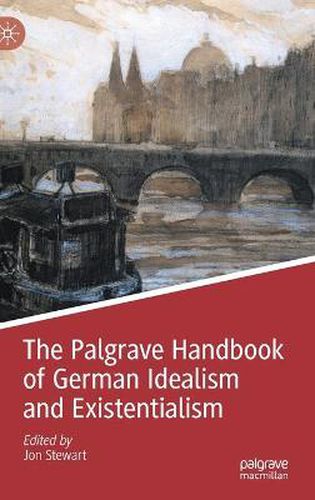Readings Newsletter
Become a Readings Member to make your shopping experience even easier.
Sign in or sign up for free!
You’re not far away from qualifying for FREE standard shipping within Australia
You’ve qualified for FREE standard shipping within Australia
The cart is loading…






This title is printed to order. This book may have been self-published. If so, we cannot guarantee the quality of the content. In the main most books will have gone through the editing process however some may not. We therefore suggest that you be aware of this before ordering this book. If in doubt check either the author or publisher’s details as we are unable to accept any returns unless they are faulty. Please contact us if you have any questions.
This Handbook explores the complex relations between two great schools of continental philosophy: German idealism and existentialism. While the existentialists are commonly thought to have rejected idealism as overly abstract and neglectful of the concrete experience of the individual, the chapters in this collection reveal that the German idealists in fact anticipated many key existentialist ideas. A radically new vision of the history of continental philosophy is thereby established, one that understands existentialism as a continuous development from German idealism.
Key Features
Operates
at both the macro-level and micro-level, treating both the two schools of
thought and the individual thinkers associated with them
Explores
the relations from shifting perspectives by examining how the German
idealists anticipated existentialist themes and how the existentialists
concretely drew on the work of the idealists Meticulously
uncovers and documents many little-known points of contact between the
German idealists and the existentialists Includes
often neglected figures such as Jacobi and Trendelenburg
This Handbook is an essential resource for researchers and advanced students interested in thinking critically about the broad development of continental philosophy. Moreover, the individual chapters on specific philosophers contain a wealth of information that will compel experts in the field to reconsider their views on these figures.
$9.00 standard shipping within Australia
FREE standard shipping within Australia for orders over $100.00
Express & International shipping calculated at checkout
This title is printed to order. This book may have been self-published. If so, we cannot guarantee the quality of the content. In the main most books will have gone through the editing process however some may not. We therefore suggest that you be aware of this before ordering this book. If in doubt check either the author or publisher’s details as we are unable to accept any returns unless they are faulty. Please contact us if you have any questions.
This Handbook explores the complex relations between two great schools of continental philosophy: German idealism and existentialism. While the existentialists are commonly thought to have rejected idealism as overly abstract and neglectful of the concrete experience of the individual, the chapters in this collection reveal that the German idealists in fact anticipated many key existentialist ideas. A radically new vision of the history of continental philosophy is thereby established, one that understands existentialism as a continuous development from German idealism.
Key Features
Operates
at both the macro-level and micro-level, treating both the two schools of
thought and the individual thinkers associated with them
Explores
the relations from shifting perspectives by examining how the German
idealists anticipated existentialist themes and how the existentialists
concretely drew on the work of the idealists Meticulously
uncovers and documents many little-known points of contact between the
German idealists and the existentialists Includes
often neglected figures such as Jacobi and Trendelenburg
This Handbook is an essential resource for researchers and advanced students interested in thinking critically about the broad development of continental philosophy. Moreover, the individual chapters on specific philosophers contain a wealth of information that will compel experts in the field to reconsider their views on these figures.